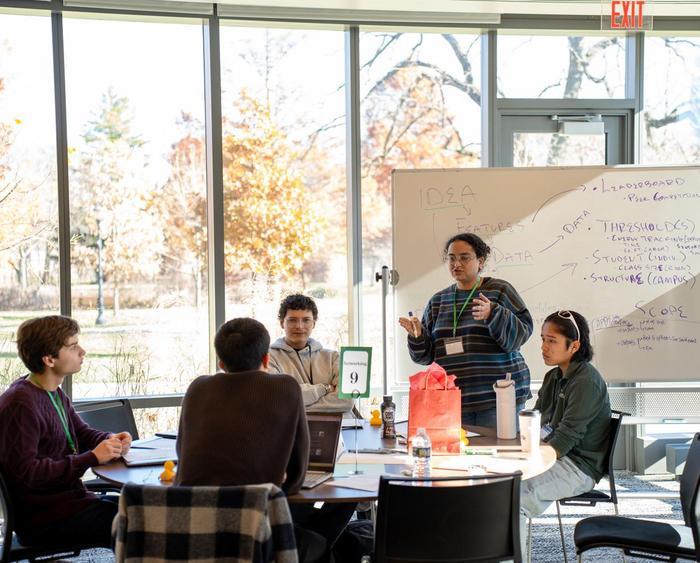Students put coding and data skills into practice at the College's first Hackathon

The College hosted its first-ever Hackathon on November 16, offering students the chance to participate in an applied coding competition to solve real-world problems.
Working in groups of four to five, students were challenged to solve an environmental issue on campus using AI. Both the team assignments and the prompt were revealed the morning of the competition, putting their problem-solving skills to the test.
The event brought together over ten professional mentors, three expert judges, and students passionate about innovating through coding. The Gorter Family Career Advancement Center (CAC), Department of Mathematics and Computer Science, and Al and data transformation firm UnKommon Revolution partnered to launch the competition.
“For me, the Hackathon showcased the collaborative excellence and community spirit that sets Lake Forest College and our career preparation efforts apart,” said Vice President for Strategic Initiatives and Career Advancement Jackie Slaats. “Alumni and friends from our employer network shared industry expertise and mentorship, faculty provided classroom insight and experience, and the CAC team focused the event on the career readiness skills that our students need and employers are seeking. And importantly, it also presented a wonderful opportunity for our students to showcase their teamwork and talent.”
From 10 a.m. to 4 p.m., teams collaborated to develop solutions based around the prompt, Planet Forest: Make Campus Greener with AI.
“For students to succeed, they had to work in groups. I think this is very good practice for when they have to work somewhere,” Ernest H. Volwiler Professor of Mathematics and Chair of Mathematics and Computer Science Enrique Treviño shared. “Students were also exposed to mentors that had a different background than what they get from their professors. I think it's useful to meet professionals with a different perspective.”
The event also provided students with job-search tips and guided mentorship from industry professionals.

Starting the Hackathon
Kathryn Kerrigan '02, owner of UnKommon Revolution, approached the CAC about starting a hackathon on campus so students could gain hands-on experience.
“As an alum, it's always meaningful to come back to campus and spark something brand new and give an opportunity for data science and computer science students to code, problem solve, and think creatively in different ways,” Kerrigan shared.

Kerrigan has worked in tech for twenty years, and throughout her career, the Florida-based alumna has participated in hackathons and judged them across the country. UnKommon Revolution donated $2,000 in prize money to be divided among the top three teams.
Kerrigan was determined to bring the intensity, creativity, and challenge of larger schools' hackathons to the College: “It was really cool to be able to bring something students may not have been open to if they were not at MIT, Stanford, or Northwestern.”
Hacking for good
After hours of working on projects, the students presented their solutions, competing for cash prizes.
Emmahous Kebede '26, Ariana Ferreira-Torralba '27, Christopher Zimbizi '27, and Saharsha Parajuli '28 were awarded first prize and $1,000. Becca Easley ’04 served as the team’s mentor.

Ferreira-Torralba '27 shared, “My favorite part of the Hackathon was watching everyone’s presentations and seeing the different ways people approached the problem. I learned new strategies, gained a better understanding of LLMs, and explored tools that make using Excel more efficient when collecting data.”
The Hackathon also pushed students to think creatively and collaborate under pressure.
“Everyone approached the problem from their own angle, and it really opened up how I looked at building a solution,” Saharsha said. “It also showed me how important teamwork is, because when everyone communicates well, things move a lot faster.”
Winning the Hackathon helped adjust Zimbizi's sense of confidence.
“I think imposter syndrome is something a lot of students experience, where you assume someone else's idea must be better,” Zimbizi said. “But winning reinforced the idea that sometimes the biggest barrier is just believing you belong in the room.”

